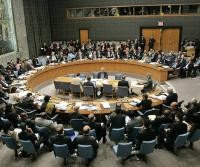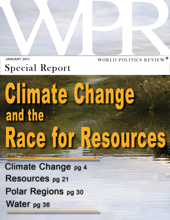The consensus has it that the big winner of the Iraq War was Iran, in that the toppling of the Saddam Hussein regime removed the major barrier containing Iran’s regional ambitions. Certainly the Shiite-dominated and Iran-friendly government in Baghdad has freed up Tehran’s hand across the region — even if, as I’ve argued before, the inherently volatile nature of Iraqi politics means that Iran has inherited some time- and energy-consuming responsibilities in Iraq along with its increased influence. But I’d argue that the fears among Middle Eastern Arab states of Iran’s growing regional reach have more to do with their […]
Asia-Pacific Archive
Free Newsletter

This is Part III in a four-part series. Part I examined the follow-up agreement to the Kyoto Protocol. Part II examined the REDD+ agreement. Part III examines financial assistance. And Part IV will examine technology transfers and adaptation. CANCÚN, Mexico — The great paradox confronting international climate change talks like December’s Cancún conference is simple: The countries who have contributed least to global emissions of greenhouse gases will bear the greatest brunt of the changing weather patterns that result from them. Conference participants and observers agree that the solution is also simple: Those who have polluted the most should fix […]
Daewoo Shipbuilding & Marine Engineering, a South Korean shipbuilder, recently submitted a $3.5-billion bid for a Brazilian warship contract. In an e-mail interview, Mingi Hyun, research fellow at the Korea Institute for Maritime Strategy (KIMS), discussed South Korea’s naval shipbuilding sector. The opinions expressed here do not necessarily reflect those of KIMS. WPR: What is the current state of the South Korean military shipbuilding sector? Mingi Hyun: Korea possesses a capable naval shipbuilding sector, composed of four government-designated naval shipbuilders: Daewoo Shipbuilding & Marine Engineering (DSME), Hyundai Heavy Industries (HHI), Hanjin Heavy Industries & Construction (HHIC) and STX Offshore & […]
Stephen W. Bosworth, the U.S. Special Representativefor North Korea Policy, offers a statement to reporters at Incheon Airport in South Korea, before meeting with South Korean Foreign Minister Kim Sung-hwan. The full text of Mr. Bosworth’s remarks upon his arrival in South Korea on Jan. 4, 2011, can be read here.

On Monday, USA Today reported that the United States Air Force was increasing the size of its Afghanistan contingent in order to keep up with the dramatic expansion in the rate of airstrikes since Gen. David Petraeus took over command of the war effort. To some, the fact that Petraeus — the American military figure most associated with FM 3-24 (.pdf), also known as the counterinsurgency (COIN) manual — is responsible for increasing the use of airpower in Aghanistan represents a paradox. FM 3-24 takes a notably dim view of airstrikes, suggesting that they “can cause collateral damage that turns […]

One global issue that looks to become more prominent in 2011 is that of United Nations Security Council (UNSC) reform. Several world leaders — including Presidents Barack Obama, Dmitry Medvedev, and Nicolas Sarkozy — have recently called for adding new members to the council, while others want to overhaul its structure and procedures. But the reformers must overcome a potential obstacle: The council just may be incorrigible by design. Most U.N. reform debates focus on how to change the Security Council to make it more representative and democratic. With respect to the former issue, the primary concern has been that, […]

2010 began with disappointment over the Copenhagen climate change summit, only to end on a note of guarded optimism over the success — or lack of failure — in Cancun. Meanwhile, changing climate patterns have opened up new areas to mineral extraction, while exacerbating existing tensions over water. All of these developments take place against the backdrop of increasing global competition for mineral resources and rare earth elements. In this special report, World Politics Review considers climate change and resource competition through articles published in 2010. Below are links to each article in this special report, which subscribers can read […]

This is Part II of a two-part series. Part I examined the reality of freedom and repression in contemporary China. Part II examines the Chinese government and society’s struggle to adapt to the information age. BEIJING — Following weeks of outraged rhetoric and divisive diplomacy from Beijing, last month’s Nobel Peace Prize ceremony was blacked out on most — but not all — of China’s international satellite channels. The New Yorker’s Evan Osnos remarked that “The black screen is a darkly comic relic . . . left over from a time when Chinese newspapers hailed bumper harvests and denounced foreign […]

This is Part I in a four-part series. Part I examines the follow-up agreement to the Kyoto Protocol. Part II will examine the REDD+ agreement. Part III will examine financial assistance. And Part IV will examine technology transfers and adaptation. CANCÚN, Mexico — Observers and participants at December’s climate change summit in Cancún, Mexico, routinely identified a follow-up agreement to the Kyoto Protocol as one area where progress was essential. The odds of reaching one were not promising. With just one year left on the Kyoto treaty, and Japan firm in its stance that it will not permit an extension […]

To kick off 2011, I thought I’d put together my top-10 international affairs wish list for the year, going from left to right on my wall map. But like Spinal Tap, only better, my list goes to 12: 1) Even more U.S. states pass decriminalization initiatives or medical marijuana laws. Yes, California’s infamous Prop 19 to legalize pot was narrowly defeated, 54 percent to 46 percent, but a majority of U.S. states are either considering such laws or already have them in place. In the four years since Mexican President Felipe Calderon declared war on the drug lords, 30,000 “soldiers” […]

This is Part I of a two-part series. Part II will appear tomorrow, and will examine the Chinese government and society’s struggle to adapt to the information age. BEIJING — China’s rise is one of the critical geopolitical variables of our time, with many in the West fearing the advent of a politically repressive, secretive new superpower. However, Chinese society is more open than is commonly believed, and in certain spheres, Chinese citizens may even enjoy greater liberty than their Western counterparts. Moving to a more realistic appreciation of the distribution of freedom and repression in contemporary China can not […]
